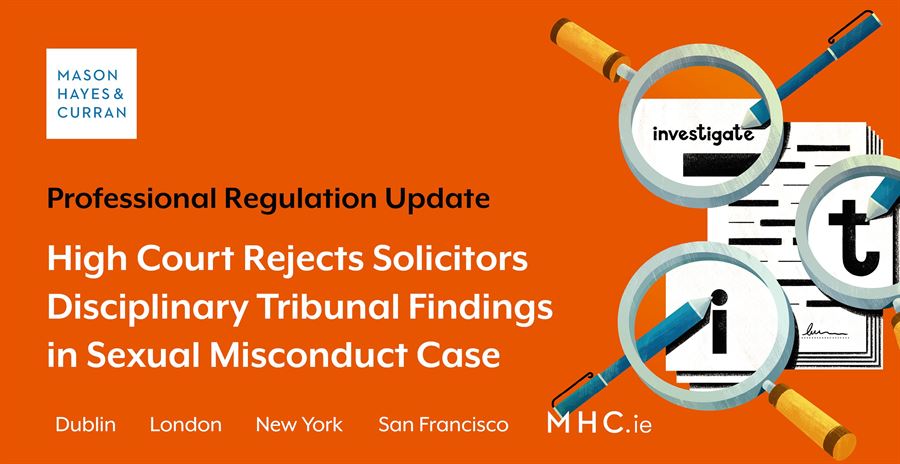Professional Regulation: High Court Rejects Solicitors Disciplinary Tribunal Findings in Sexual Misconduct Case

In January 2020, the Solicitors Disciplinary Tribunal decided that Ryan Beckwith, a former partner at Freshfields Bruckhaus Deringer LLP, was guilty of misconduct. The allegations related to an incident following a night out with colleagues in July 2016, which ended with a sexual encounter at a junior lawyer’s flat. The junior lawyer was, at the time, an associate solicitor at the same firm, and in the same department as Mr Beckwith. The Solicitors Regulatory Authority (SRA) alleged that Mr Beckwith had breached Principles 2 and 6 of the SRA Code of Conduct 2011 on the basis that his conduct was in breach of his professional obligations to act with integrity and maintain the trust of the public in the profession.
The Tribunal ruled that Mr Beckwith’s conduct surrounding the incident was inappropriate and lacked integrity. The Tribunal however, rejected the SRA’s case that Mr Beckwith had abused his position of authority. Instead, it found he had breached both principles because his behaviour in engaging in sexual activity was ‘inappropriate’ and that his conduct affected not only his personal reputation, but the reputation of the profession. Consequently, the Tribunal determined that the matter ought to bear the scrutiny of the regulator. It then ordered Mr Beckwith to pay a fine of £35,000 plus £200,000 towards the SRA’s legal costs.
Appeal
Mr Beckwith contended that the Tribunal was wrong to conclude that his conduct amounted to a breach of Principle 2 or Principle 6. Mr Beckwith also argued that the Tribunal’s findings had breached his right to respect for private life guaranteed by article 8 of the European Convention on Human Rights. He also challenged the Tribunal’s decision on costs.
High Court decision
The High Court held that the Tribunal had erred in its application of Principle 2 and Principle 6 of the SRA 2011 Code[1].
Acting with integrity
The High Court found that the Tribunal had been wrong to find that Mr Beckwith had failed to act with integrity, thus breaching Principle 2. The critical matter was the allegation that Mr Beckwith’s conduct amounted to an abuse of his position of seniority or authority.
On that allegation, the Tribunal had concluded that, while Mr Beckwith realised that his actions were inappropriate, there was no abuse of a position of seniority or authority. The Court concluded that the Tribunal was right to conclude that no abuse of authority had occurred. However, the High Court then held that the Tribunal had made an error by categorising those events as it has assessed them to be a breach of Principle 2. On the findings made by the Tribunal itself, the requirement to act with integrity, which obliged Mr Beckwith not to act so as to take unfair advantage of the junior lawyer by reason of his professional status, had not been breached. Therefore, the Tribunal's final statement that Mr Beckwith had “fallen below accepted standards” was not coherent.
Maintaining public trust in the profession
The Tribunal had concluded that Mr Beckwith had acted in breach of Principle 6 because “members of the public would not expect a solicitor to conduct himself in the way [Mr Beckwith] had.”
The High Court found that the Tribunal’s conclusion on the application of Principle 6 on the facts as the Tribunal had found them to be was also flawed.
The Court distinguished between conduct which does or may tend to undermine public trust in the solicitor’s profession and conduct that would be generally regarded as wrong, inappropriate or even for the person concerned, disgraceful.
The Court accepted the SRA’s submission in the appeal that the public would have a “… legitimate concern and expectation that junior members [of the profession or of staff] should be treated with respect …” by other members of the profession. The Court agreed that seriously abusive conduct by one member of the profession against another, particularly by a more senior against a more junior member of the profession is clearly capable of damaging public trust in the provision of professional services by that more senior professional and even by the profession generally.
However, the Court stated that the facts as found by the Tribunal were not capable of supporting the conclusion that Mr Beckwith acted in breach of Principle 6. It noted that Mr Beckwith’s actions had affected his own reputation; but that there is a qualitative distinction between conduct of that order and conduct that affects either his own reputation as a provider of legal services or the reputation of his profession. It noted that conduct amounting to an abuse by a solicitor of his professional position is clearly capable of engaging Principle 6. But, as the Tribunal concluded, that was not the case here.
Article 8 of the European Convention of Human Rights
The High Court said there can be no ‘hard and fast rule’ that regulation may never be directed to a person's private life, or that any/every aspect of her private life is liable to scrutiny. These rules, it added, should only apply when part of a person’s private life “realistically touches” on their practice of the profession or the standing of the profession.
Key takeaways
This judgement is a clear warning to regulators that their remit is limited to conduct which touches on the profession. The judgement makes a clear distinction between conduct that brings the professional’s own reputation into disrepute and conduct that brings the profession into disrepute. The SRA has indicated that it will look at the High Court’s judgment carefully before considering any next steps.
For more information on the regulation of professionals, contact a member of our Professional Regulatory & Disciplinary team.
The content of this article is provided for information purposes only and does not constitute legal or other advice.
[1] Beckwith v Solicitors Regulatory Authority [2020] EWHC 3231 (Admin)
Share this:


